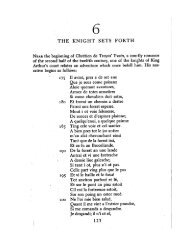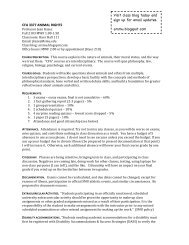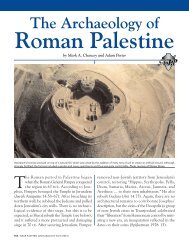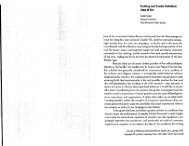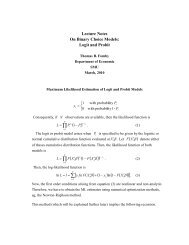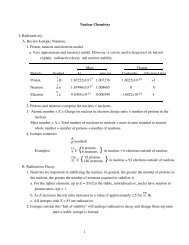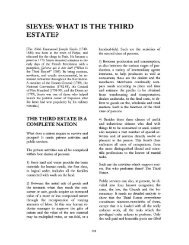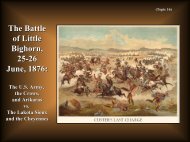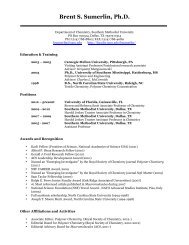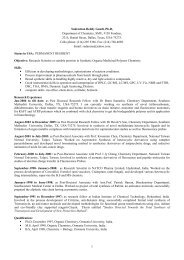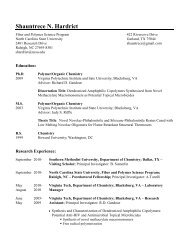VOLTAIRE THE MAID OF ORLEANS [La Pucelle D'Orleans] VOL ...
VOLTAIRE THE MAID OF ORLEANS [La Pucelle D'Orleans] VOL ...
VOLTAIRE THE MAID OF ORLEANS [La Pucelle D'Orleans] VOL ...
You also want an ePaper? Increase the reach of your titles
YUMPU automatically turns print PDFs into web optimized ePapers that Google loves.
<strong>THE</strong> <strong>MAID</strong> <strong>OF</strong> <strong>ORLEANS</strong>.<br />
CANTO I.<br />
ARGUMENT<br />
<strong><strong>VOL</strong>TAIRE</strong><br />
<strong>THE</strong> <strong>MAID</strong> <strong>OF</strong> <strong>ORLEANS</strong><br />
[<strong>La</strong> <strong>Pucelle</strong> D’Orleans]<br />
<strong>VOL</strong>. XX - PART I<br />
<strong>THE</strong> CHASTE LOVES <strong>OF</strong> CHARLES <strong>THE</strong> SEVENTH and AGNES<br />
SOREL. -- <strong>ORLEANS</strong> BESIEGED BY <strong>THE</strong> ENGLISH. -- APPARI-<br />
TION <strong>OF</strong> SAINT DENIS, ETC.<br />
The praise of saints my lyre shall not rehearse, Feeble my voice, and too profane my verse; Yet<br />
shall my Muse to land our Joan* incline, Who wrought, ‘tis said, such prodigies divine; Whose<br />
virgin hand revived the drooping flower, And gave to Gallia’s lily tenfold power; Rescued its<br />
monarch from the impending fate So dreaded from victorious England’s hate; Made him give<br />
praise at Rheims to God adored, 1 While on his temples holy oil was poured; Although in visage<br />
Joan appeared the maid, Although in stays and petticoat arrayed, With boldest heroes she sustained<br />
her part, For Joan possessed a Roland’s dauntless heart: For me, much better should I love by<br />
night A lamb-like beauty, to inspire delight; But soon you’ll find thro’ every glowing page, That<br />
Joan of Arc could boast the lion’s rage; You’ll tremble at those feats she dared essay How<br />
dauntlessly she braved the bloody fray; But greatest of these rare exploits you’ll hear, Was, that<br />
she kept virginity -- a year.<br />
O Chapelain! 2 O thou whose violin Produced of old so harsh, so vile a din; Whose bow Apollo’s<br />
malediction had, Which scraped his history in notes so sad; Old Chapelain, to honor thy dull<br />
Muse, In me thy genius thou wouldst fain infuse; But no, I’ll none on’t, ‘tis for me unfit, Far<br />
better suited to Motte Houdart’s wit, Whose brain produced the Iliad Travesty, Or to some friend,<br />
of his academy.<br />
One Easter-tide, good Charles in youthful prime, 3 At Tours renowned, thought fit to spend his<br />
time; Where, at a ball, for much he loved to dance, 4 It so fell out, that for the good of France, He<br />
found a maid who beggard all compare, Named Agnes Sorel, - Love had framed the fair: 5 Let your<br />
warm fancy youthful Flora trace, Of heavenly Venus add the enchanting grace, The wood nymph’s<br />
stature and bewitching guise, With Love’s seductive air and brilliant eyes, Arachne’s art, the<br />
siren’s dulcet strain,<br />
All she possessed; and, in her rose chain, The sage and hero each might have been proud, and<br />
monarchs linked, before her beauty bowed; To see her, love her, feel the kindling fire, To ardent
flame, the soft, the fond desire; To tremble and regard with dove-like eyes, To strive to speak and<br />
utter naught but sighs, Her hands, with a caressing hand to hold, Till painting all the flames her<br />
breast enfold. By turns each other’s tender pains impart, and own the luscious thrill that sways the<br />
heart; To please, in short, the task is of a day, For kings in love have a peculiar way. 6 Agnes, well<br />
versed in the seductive art, ‘Neath veil mysterious strove to play her part, Veil of thin gauze,<br />
through which will always pry The envious courtier’s keen, malignant eye.<br />
To mask this business, and that none might know, The king made choice of Counsellor Bonneau; 7<br />
Sure confidant, well versed in each device, Who filled a certain post not over nice: One who at<br />
court, where fangled terms they lend, Is commonly esteemed the prince’s friend; But, in the town,<br />
and where vile peasants live, Pimp is the name such vulgar people give. Where Loire majestic<br />
winds its limpid flood, A stately castle on the margin stood, “Twas Bonneau’s: thither was one<br />
night conveyed, Upon the silvery stream the blushing maid; There Charles in darkness to his<br />
Agnes hied; They supped, while Bonneau served the rosy tide; No pomp was seen, ‘twas all for<br />
pleasure wrought; Feasts of the Gods, ye are to this but naught.<br />
Each fired alike with Love’s ecstatic ray, Maddened with passion, to their hopes a prey, Darted<br />
warm looks which every wish inspired, Forerunners of the pleasures they desired. Their converse<br />
tender, nor with coarseness fraught, Spurred the impatience that usurped each thought; The prince<br />
inflamed, with eyes her charmes devoured, While in her ear, Love’s tender tale he poured, With<br />
feverish touch, her lily hand caressed, While oft his knees ‘gainst hers were closely pressed.<br />
The banquet finished, music played awhile, The air Italian, in chromatic style; Flutes, hautboys,<br />
viols, softly breathed around, While three melodious voices swelled the sound; They sand in<br />
allegory, and the strain Told of those heroes mighty love had slain, Who fled of sounding glory the<br />
career, To please the tender fair they loved most dear. The concert echoed from concealed alcove,<br />
Close to the chamber, then the scene of love. Thus beauteous Agnes, the discreet and wise, Heard<br />
all, but was not seen by human eyes. The moon’s pale course spoke midnight near at hand, The<br />
hour flor bliss, which lovers understand.<br />
In a recess adorned, which met the gaze, Neither obscure, nor filled by splendid rays, Between<br />
two rich embroidered sheets were laid The dazzling beauties of the heavenly maid. Near the alcove<br />
a portal open stood, Which gentle Alix, dame expert and good, The chamber quitting never thought<br />
to close. O! You in whose soft breasts the passion glows, Lovers, ‘tis you can feel the sharp<br />
desire, The strong impatience of great Gallia’s sire. The graceful tresses that adorned his head,<br />
Already were with choicest perfumed spread, He came! O! Tender moment, blissful night, He<br />
sprang towards his mistress with delight! Quick throbbed their hearts; both tender love and shame<br />
The cheek of Agnes tinged with roseate flame; But bashfulness soon fled; the lover’s arms<br />
Banished all fears, save tender love’s alarms; Dazzled, enchanted were his ardent eyes, That wildly<br />
gazed upon the heavenly prize: Who but would worship, that like him had pressed A neck in fairest<br />
alabaster dressed; Two rising orbs at equal distance placed, Heaving and falling, by Love’s pencil<br />
traced, Each crowned with vermil blood of damask rose; Enchanting bosom which ne’er knew<br />
repose, You seemed the gaze and pressure to invite, And wooed the longing lips to seek delight.<br />
Ever complying with my reader’s taste, I mean to paint as low as Agnes’ waist; To show that<br />
symmetry,devoid of blot, Where Argus’ self cxould not discern a spot; But virtue, which the<br />
world good manners calls, Stops short my hand,-And lo! The pencil falls.<br />
In Agnes all was beauty, all was fair,’ Voluptuousness, whereof she had her share, Spurred<br />
every sense which instant took th’ alarm, Adding new grace to every brilliant charm It animated:
Love can diguise, And pleasure heightens beauty in our eyes. Three months they shared this<br />
ecstasy of joy, Nor did one envious cloud their bliss annoy.<br />
Love’s couch they left, and then to table hied; There with fresh vigor was each nerve supplied,<br />
Rekindling all that strength whcih love had tamed; Anon to join the chase they felt inflamed, And<br />
mounted both on gallant steeds of Spain, With yelping hounds they coursed the verdant plain:<br />
Returned, they sought the bath’s refreshing stream; Arabian odors, paste and perfumed cream, All<br />
that could soften, polish and delight, Was spread with bounteous hand, to please the sight.<br />
The dinner served, what dainties met the eyes, The pheasant and each tender bird that flies;<br />
Ragouts delicious, whcih exhaled a smell, Pleasing the nose and palate, passing well: Wine d’Ai,<br />
whose froth in sparks died quick away, And goblets of the yellow hued Tokay Warmed the young<br />
brain with fire, that could not fail In sallies of the liveliest wit to exhale; Brilliant as liquor when the<br />
bubbles swim, And sparkling dance around the goblet’s brim: Bonneau, with peals of laughter<br />
loud and free, Paid homage to his good king’s grand esprit.<br />
The banquet ended, mirth and jest went round; Blind to their own, their neighbors’ faults were<br />
found; By Master Alain verses loud were bawled, 8 Then were the doctors of the Sorbonne called,<br />
An harlequin, who wore the motley shape, Some squalling parrots, and an antic ape. Forth to the<br />
play just as the sun withdrew, The monarch hurried with a chosen few, And to conclude once<br />
more the blissful day, The pair, with love overcome, both died away.<br />
Plunged in the soft excess of dear delight, The pleasure seemed redoubled with the night; Each<br />
moment happy and with ardor fired, No quarrel, nor no jealousy inspired; No languor: Time and<br />
Love in Agnes’ sight Having forgot to wing their wonted flight: Charles oft would say when<br />
locked in her embrace, Imprinting burning kisses on her face: “My love, my Agnes, idol of my<br />
soul, Thy charms are dearer than the world’s control. To conquer and to reign is folly now, My<br />
Parliament forsakes me, and I bow ‘Fore conquering England’s matchless bravery, Well, let them<br />
reign, but let them envy me; I have thy heart, and am more king than they.” The speech was not<br />
heroical, you’ll say, But when an hero’s with his love in bed, ‘Tis passion sways alike the heart<br />
and head; Fired with this earthly paradise his lot, What’s said at night, next morn may be forgot.<br />
As thus he lived from every sorrow free, Just like an abbott, in his rice abbey, 9 The English<br />
Prince, with whom wasr was the word, 10 In camp quite armed, well booted too and spurred, With<br />
dagger at his side and lance in rest, The vizor down of helm that cased his crest, Trampled<br />
contemptuosly the conquered land; He marched, he flew, all fell beneath his hand, He levelled<br />
walls and turrets, spilt our blood, Robbed, taxed, and pillaged, for his army’s good, Gave<br />
mothers, daughters, to his soldiers’ rage, And violated nuns of every age, Drank of the monks’<br />
rich stores of rosy wine,<br />
Nor left on bottle of the muscadine; Gold they purloined which relics had enchased, Then into<br />
useful coin the ore debased; Each sacred ordinance by them was spurned, Churches and chapels<br />
were to stables turned; just so when greedy wolves, with ravenous eyes, Spring ‘mid the fold and<br />
seize the bleating prize, tear with their recking jaws the victim’s breast, While in a distant meadow<br />
lulled to rest, Colin, enfolded in his loved-one’s arms, Sleeps undisturbed, contented with her<br />
charms, While near him, lo! His dog devours the meat, Which, at his supper, Colin could not eat.<br />
Bright apogeum, golden gleam so high, Mansion of saints beyond weak mortal’s eye; “Twas<br />
thence Saint Denis gazed on Gallia’s woes, 11 The pangs inflicted by its conquering foes; Paris
subdued, enchained its royal sire, Heedless of all, save Agnes and love’s fire; 12 This Denis,<br />
Frenchmen Gallia’s patron paint, As anciently of Rome, Mars was the saint, Or Pallas, with the<br />
brave Athenian race, Allowing a small difference in the case, That one bright saint I’ the scale will<br />
have this odds, He’ll counterbalance all the heathen gods.<br />
“Ah! By the Lord,” said he, “it is not just That mighty France should be humble with the dust,<br />
Where I myself Religion’s banner spread; And shall the flower de luce thus hang its head? Blood<br />
of Valois, thy sufferings touch my breast, 13 Let us not suffer the aspiring crest Of the fifth Henry’s<br />
brothers, without right, 14 The lineal heir of France to put to flight; I have, though saint, and God<br />
accord me grace, A rooted hatred to the British race, For, if the book of destiny speaks true, The<br />
day shall come when this bold thinking crew Will saints and their decrees both laugh to scorn; The<br />
Roman annals will by them be torn,<br />
and yearly they’ll in effigy destroy Rome’s sacred pontiff and the Lord’s viceroy. Let us revenge<br />
this sacrilegious thought, and punishment inflice, ere it be wrought; My French beloved, ye shall<br />
be Catholics, And ye, fierce English, shall be heretics. Chase hence these British dogs, leave not a<br />
man, Let’s punish them by some unheard of plan, For all this wickedness which they intend,”<br />
Thus spoke the patron Denis -- Franch’s friend, Guardian of Gallia’s flower de luce so fair, Then,<br />
muttering curses, mumbled the Lord’s Prayer.<br />
While thus alone the saint conned o’er the case, A council then at Orleans 15 took place. Blockaded<br />
was the city round about, Nor could it longer for the king hold out; Some grey old counsellors and<br />
lords of might, One half pedantic, t’other bred to fight, Alike, in doleful tones exclaimed each one,<br />
“Alas! My friends, what further can be done?” Potton, 16 Denois, 17 LA Times Hire, 18 could bear no<br />
more, So cried, as in despite their nails they tore: “Come friends, at once let’s bravely death defy,<br />
And prove that for our country we can die.” “By heaven,” cried Richemont, “Wherefore thus sit<br />
tame? Let us at once set Orleans in a flame; Let us the foe deride, and thus expire, Leaving them<br />
naught but ashes, smoke and fire.” Trimouille 19 exclaimed: “That moment vain I rue, When<br />
parents made me native of Poitou; For Orleans’ town from Milan did I flee, Quitting, alas! My<br />
charming Dorothy; Though ‘reft of hope ‘fore Heaven, I yet will fight; Yet must I die, unblest by<br />
her dear sight?” Louvet, 20 the president, great personage, Whose grave appearance might have<br />
dubbed him sage, Exclaimed: “ ‘Twould previously be my intent That we should pass an act of<br />
Parliament Against the British; and that in such case, Each point be canvassed in its proper place.”<br />
Great clerk was Louvet, yet he could not trace, With mental ken, his sad and piteous case; Had this<br />
been known, his grave thoughts he had bent On sage proceedings ‘gainst dame president Of dire<br />
besiegers, Talbot, chief of fame, Burns to possess her -- she requites his flame. Louvet,<br />
unconscious of the fateful thrall, Strives with male eloquence to rescue Gaul. Amid this council of<br />
the wise and brave Were heard orations eloquent and grave, Virtue inspiring and the public good;<br />
Foremost in flowing phrase is understood LA Times Hire, who, though to long harangues<br />
inclined, So ably speaks as to enchain the mind. Much were their arguments with wisdom fraught;<br />
Their words were gold, but they concluded naught.
While thus haranguing, they beheld in air A strange appearance, most divinely fair; A lovely<br />
phantom, tinged with vermil dye, Enthroned on sunbeam, ‘mid the azure sky, Which, through the<br />
wide aerial expanse sailed, A saint-like odor all around exhaled; This imp, o’er front, a pointed<br />
mitre wore, With gold and silver wrought: behind -- before; A streamer, loosely hung on either<br />
side His Dalmatic, the breezes wafted wide; With dazzlingglory was his front arrayed; 21 His head<br />
reclined, the embroidered Stole displayed; 22 He bore the pastoral Crozier in his hand, 23 Which<br />
was, in ancient times, the Augur’s wand.<br />
Struck with the sight which they but ill discerned, Each his regard upon his fellow turned;<br />
Trimouille the first, a lecherous devotee, Began to pray upon his bended knee. Richemont, whose<br />
breast an iron heart concealed, Blashphemer, and whose lips but oaths revealed, Raising his voice,<br />
exclaimed: “It is the devil From hell arrived, dread mansion of all evil’ “Twould be, methinks,<br />
agreeable and strange, Could we with Lucifer some words exchange.” Away ran Louvet, in his<br />
zeal quite hot, To fetch of holy water a full pot: Bewildered Poton, Dunois, and LA Times Hire,<br />
Opened their eyes all three, appalled with fear; Stretched on his belly every valet laid: The Saint<br />
appeared, in lustrous garb arrayed; Borne on bright gleam, descended to the ground, Then dealt his<br />
holy benediction round. They knelt, and crossed themselves; the vision fair Raised them from earth<br />
with kind paternal care, Then said aloud: “My sons, be not afraid, My name is Denis, 24 I’m a saint<br />
by trade; Gaul has by me been loved and catechised, But all my favor now is scandalized, To see<br />
my godson Charles I loved so dear, Whose land’s in flames, whose subjects quake with fear,<br />
Rather than seek to comfort the distressed, Spend all his time upon a strumpet’s breast. I have<br />
resolved, by saint-like mercy led, To fight for those who in his care have bled; I wish to end the<br />
woes you have endured, “Tis said all ills by contraries are cured; So, if the monarch for an harlot<br />
fain Will lose his kingdom and his honor stain, I have resolved to save the kind and land, and<br />
work my purpose by a maiden hand; If for protection from on high you’d sue, If ye are Frenchmen<br />
tried and Christians true; If ye love King, Church, and State, arise, Assist me in my sacred<br />
enterprise; Guide me where I should seek the bird at rest, and rouse the glorious phoenix from its<br />
nest.”<br />
Thus having spoke, the Sire then held his tongue, When lo! The chamber with loud laughter rung;<br />
Young Richemont, framed for pleasantry and joke, Anon the learned preacher thus bespoke: “Ah!<br />
Wherefore, good Sir Saint, take so much pains, Abandoning for earth your heavenly plains, Of us<br />
poor sinful mortals to inquire For this dear treasure you so much admire? To save a city, I could<br />
never see That there was magic in virginity; Besides, to seek it, wherefore hither come, You that<br />
already have such stores at home? The countless tapers at Loretto’s shrine, 25 Are naught in number<br />
to your maids divine; With us in France, there are, alas! No more, Our convents are all silent on<br />
that score: Our princes, officers, and archers free, The prinvinces have stripped of each degree; Of<br />
saints, to prove that they were naught afraid, More bastards far than orphans have they made. To<br />
finish, Mister Denis, our dispute, Seek maids elsewhere; there’s no one here will suit.” 26 The saint<br />
blushed to hear such loose discourse, Then quick remounted on his heavenly horse, Upon his<br />
golden gleam; nor word spake more, Spurred either side, and through the air did soar, To see if<br />
that bright jewel could be had, So wondrous rare -- for which he seemed stark mad: Well, let him<br />
go, and while perched on a ray, Bespeaking the approach of jocund day, Friend reader, when on<br />
love you fix your mind, May you gain that which Denis went to find.<br />
END <strong>OF</strong> CANTO I


![VOLTAIRE THE MAID OF ORLEANS [La Pucelle D'Orleans] VOL ...](https://img.yumpu.com/10164058/1/500x640/voltaire-the-maid-of-orleans-la-pucelle-dorleans-vol-.jpg)
